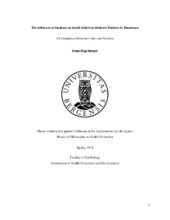The influence of fatalism on health beliefs of diabetic patients in Khartoum: A comparison between the Copts and Muslims
Master thesis
Permanent lenke
https://hdl.handle.net/1956/8214Utgivelsesdato
2014-05-19Metadata
Vis full innførselSamlinger
Sammendrag
Objectives: The objectives of this research was to explore how the belief in fatalism influences health beliefs in diabetic patients and to compare the differences in fatalistic beliefs between Coptic and Muslim diabetics in Khartoum. The study was concerned with three main questions; 1) What fatalistic beliefs do Coptic and Muslim diabetics in Khartoum have? 2) How do those fatalistic beliefs influence their health beliefs? 3) How do those beliefs influence their health behavior? Methods: Three groups were identified and interviewed. Those groups were; 1) a diabetic group, 2) a medical group, and 3) a religious scholar/cleric group. The groups themselves were divided into Coptic and Muslim. Each group had one Cleric, one medical doctor, and five diabetics. However, only three Coptic diabetics were allocated for the diabetics' interviews. A research assistant was present at all the interviews for cross-reference. An audio recorder was used in seven of the 12 interviews. Results and Discussion: The religious meaning of fatalism according to my participants was the notion that all events, including health and illness are God driven, however, not all illness is from God, and they believed that illnesses can be a result of individual choices. Furthermore, health is considered a blessing that individuals should protect, and illness as a result of many factors, such as behavioral and genetic, and should be utilized to teach patience. Fatalism as a religious concept does not render people powerless. Both the Coptic and Muslim participants did not feel that their health is not in their control. On the contrary, they believed that they are responsible for their health and well-being. Fatalistic beliefs to them meant to accept what is not in your control, as well as making the right choices, or the healthy choices in illness. The belief in God and that God will not give people something that they cannot handle was expressed, which puts more emphasis on the choices they make and their responsibility towards their health. The concept of health being out of their control was not evident for most of my participants, neither were any feelings of hopelessness. Health behavior and adherence issues were attributed to demographic and sociopsychological variables rather than religious beliefs or fatalistic beliefs. Conclusion: Three main findings are noted here. First, fatalism as a religious concept does not render individuals hopeless and disempowered. The Coptic and Muslim understanding of fatalism is similar in that they both specify the necessity of individual choice and free will. Second, fatalism as a religious concept helps people cope with their illness for the attribution of God's presence in their lives and the belief that God does not give people what they cannot handle. The latter in particular is an empowering concept and can be utilized to promote health. In addition to that, this line of thinking strengthens individual's sense of coherence and does not label individuals with their disorder, instead making the individual a complete person with a stressor such as diabetes. Third, behavioral outcomes are related to factors such as demographic and sociopsychological variables, and not directly linked to fatalistic beliefs.
